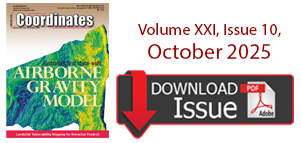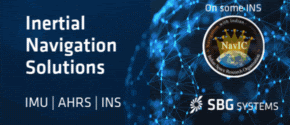| GNSS News | |
GNSS
Japan launches Michibiki 2
Japan launched an H-2A rocket which carries the satellite called “Michibiki No.2” from a space center in Tanegashima, southern Japan.
The first Michibiki satellite was launched into space in 2010 on a trial basis and two more satellites will be sent later this year, according to the Cabinet Office. Once the four satellites are in orbit, at least one satellite will be fl ying over Japan for eight hours per day. Combining with the U.S. GPS and the Japanese system will enhance the stability of receiving radio waves and increase the precision of position information. www.usnews.com
China launches satellite navigation positioning system
China has launched national satellite navigation and positioning system, which will provide positioning service to transportation, emergency medical rescue and city planning and management. It is the largest in the country and boasts the widest coverage, officials said. Li Weisen, deputy director of the National Administration of Surveying, Mapping and Geoinformation, said that the system consists of 2,700 base stations, a national database centre and 30 provincial level database centres.
The system, featuring faster speed, higher accuracy and wider coverage, will be compatible with other satellite navigation systems, such as the BeiDou and GPS, Li said. http://indianexpress.com
GPS III in full production
In a specialized cleanroom designed to streamline satellite production, Lockheed Martin is in full production building GPS III – the world’s most powerful GPS satellites. The company’s second GPS III satellite is now assembled and preparing for environmental testing, and the third satellite is close behind, having just received its navigation payload. In May, the U.S. Air Force’s second GPS III satellite was fully assembled and entered into Space Vehicle (SV) single line fl ow when Lockheed Martin technicians successfully integrated its system module, propulsion core and antenna deck. GPS III SV02 smoothly came together through a series of carefully-orchestrated manufacturing maneuvers utilizing a 10-ton crane. GPS III SV02 is part of the Air Force’s next generation of GPS satellites, which have three times better accuracy and up to eight times improved anti-jamming capabilities. Spacecraft life will extend to 15 years, 25 percent longer than the newest GPS satellites on-orbit today. www.lockheedmartin.com/gps.
Report estimates cost of disruption to GPS in UK would be £1bn per day
The UK stands to lose £1bn per day in the event of a major disruption to the GPS, according to a government report. Emergency services would also be severely affected and struggle to cope with demand. Longer emergency calls, less efficient dispatch, navigation, and congested roads would mean a total estimated loss of £1.5bn. Besides navigation, many industries are reliant on GPS software for swathes of critical applications such as financial trading and precision docking of oil tankers.
The report, titled The economic impact to the UK of a disruption to GNSS and commissioned by quangos Innovate UK and Space UK, follows an incident last year where an error in the GPS network triggered by the decommissioning of a US satellite had knock-on effect across a number of British industries.
The report raises questions as to whether the government should invest in a national backup and what that should be, or if it ought to promote a commercially based backup that government and companies can use as needed. https://www.theregister.co.uk
Russia and Brazil may expand space cooperation
Russia and Brazil are studying the possibilities of expanding their cooperation in the space sphere, Russian President Vladimir Putin said after negotiations with President of Brazil Michel Temer.
“A possibility is being studied for joint launches from the Brazilian cosmodrome and the joint production of small- and medium-class carrier rockets,” Putin said.
“An electro-optic complex has been opened on the territory of Brazil for detecting space debris and four ground-based stations of Russia’s Glonass global navigation system are in operation,” Putin said.
Temer expressed interest in expansion of the network of GLONASS stations on the territory of his country.
“We assessed positively the experience of creating the stations of the Russian GLONASS system in Brazil, and we, for our part, expressed interest in expanding the network of these stations,” he said. http://tass.com/science/952649
Turkish Airlines to optimize navigation capabilities
Boeing has announced, through its subsidiary Jeppesen, a new 10-year service contract with Turkish Airlines, the national carrier of Turkey. The agreement includes both paper and digital Jeppesen charts, FliteDeck Pro, electronic fl ight bag (EFB) services, NavData digital navigation services, Airport Moving Map capabilities, e-Link digital chart library services and Receiver Autonomous Integrity Monitoring (RAIM) prediction technology. Jeppesen navigational data is provided to customers on a “changes-only” basis, which allows for data download speeds that are many times faster than comparative industry providers. Aiding Turkish Airlines navigation capabilities, Jeppesen RAIM technology assesses the integrity of GPS signals and the accuracy of airborne GPS navigation equipment. Its NavData is developed from a comprehensive aviation database, which is composed of more than one million records. To ensure accuracy, Jeppesen fl ight information analysts edit and verify approximately 150,000 database transactions generated from worldwide aviation data source documents during every 28-day revision cycle. www.jeppesen.com
CNES Offering two new Android Apps for GNSS
French Space Agency CNES – with support from its subcontractor C&S – has made available two Android applications on the Google Play store, compatible with Android Nougat and validated on a Nexus 5X device.
The two new apps are:
• RTCM Converter: this app converts the smartphone GNSS raw measurements to Radio Technical Commission for Maritime Services messages (RTCM message type 1077) and sends them to a caster for further use by third-party softwares.
• PPP WizLite: this app is a lite version of the CNES PPP-Wizard client, currently using only pseudorange and Doppler raw measurements. The app uses these measurements along with external RTCM streams for orbit and clock corrections and broadcasts, such as the ones available from the International GNSS Service Real-Time Service (IGS RTS), to compute the precise position of the phone in real time.
The new Android 7 (Nougat) operating system allows recovering raw measurements from the smartphone’s GNSS receiver. www.ppp-wizard.net
Next Gen GLONASS Satellite to launch next year
The first of a new generation of GLONASS satellites will be launched next year says the satellite manufacturer, Reshetnev Information Satellite Systems. The next gen satellite will launch from the Plesetsk spaceport in North Russia. Called Glonass-K2, the new satellites are distinguished by improved accuracy and longer ten-year operational lifespans compared to seven years for the previous generation. And at 1,800kgs they are twice as heavy as the previous K1 series. tass.com
First GNSS Integrated in Narrowband Cat-M1 and NB1 Cellular IOT Chipset
Altair Semiconductor has demonstrated GNSS functionality integrated in its new ALT1250 narrowband CAT-M1 and NB1 (NB-IoT) chipset. It is the only narrowband cellular IoT chipset in the market that incorporates GNSS/ GPS functionality. In addition to GNSS functionality, its extreme level of integration eliminates the need for most external components required to design a cellular IoT module. Approximately the size of a shirt button and less than 100mm2 in size, an ALT1250 module features support for both Release 13 standards – CAT-M1 and NB1, and includes a wideband RF front-end supporting unlimited combinations of LTE bands. www.altair-semi.com












 (No Ratings Yet)
(No Ratings Yet)






Leave your response!